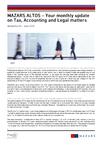
Your monthly update on Tax, Accounting and Legal matters - June 2018
VAT
Payment of VAT on construction works performed for own business purposes: law amendment
Following the Belgian VAT Code, construction works performed for own business purposes were always deemed to qualify as taxable services. As a consequence, an internal document had to be issued whereby the taxable amount was equal to the "normal value" of the supplied services (i.e. as would the services have been rendered for another independent party). The VAT amount had to be reported in the VAT return as VAT due and as deductible (if one was eligible to deduct input VAT). In a lot of situations, this led to a zero operation without any cash-impact for the VAT authorities or for the VAT-payer. It was merely a formality which was more penalised than useful.
Therefore, as a reaction to growing criticism of the European Commission, the above will no longer apply for taxable persons who have a full right to deduct input VAT. From now on, the above will only apply in case construction works are performed by a taxable person without a full right to deduct. Nevertheless, in view of possible VAT revisions, invoices relating to construction works (purchase of building material,…) should always be included in the table of company assets.
CJEU case law: the right to deduct VAT, even outside statute of limitation period?
The right to deduct VAT is seen as the cornerstone of the VAT scheme in order to ensure fiscal neutrality between two taxable persons. However, in order to exercise the right of deduction or reimbursement, some critical requirements must be met; both substantive as formal requirements. Moreover, the deadline of 3 years should be taken into account in order to exercise this right.
The EU Court of Justice ruled in two recent judgements (Volkswagen AG case; C-533/16 and Biosafe case; C-8/17) that the right to deduct may not be refused solely on the ground that the period for the exercise of that right has expired. As such, the imposed time limits should be nuanced under some circumstances.
The case concerned the deduction of input VAT on revised invoices in 2014 for which the initial invoices, covering a period between 2004 and 2010, were issued incorrectly without VAT. The ECJ ruled that he VAT can still be deducted on the 2014 invoices, even though that the taxable transactions took place between 2004 and 2010. The reason is because the tax payer only had an invoice with VAT in 2014 and he was not in the possibility to deduct the VAT earlier.
As a consequence of those judgements the deduction or reimbursement of (foreign) VAT will be accepted, even though the time limit has expired, if it appears the taxpayer acted in good faith and if it was objectively impossible to exercise its right to deduct before.
Gilles Tack – VAT Manager – gilles.tack@mazars.be
PERSONAL INCOME TAX
Mobility allowance or "Cash for car" implemented on May 7, 2018
The mobility allowance, announced in our May update, was published in the Belgian Official State Gazette on May 7, 2018.
The implementation of a "Cash for car system" is no obligation of the employer and cannot be claimed by the employee.
The mobility allowance can only be requested by the employee in case he disposes of a company car for at least 3 months. Special rules are applicable by changing from employer and for new employers.
By returning their company car (with fuel card), employees will receive a (annual) mobility allowance in return. This exchange should be considered as a full exchange since the employee will renounce his right to a company car and all related benefits. This allowance should then be used by the employee to finance his private travel and commuting.
The amount of the mobility allowance will be calculated based on the catalogue value of the company car and will be increased in case the employee had a corporate fuel card at his disposal and will be decreased with any personal car related contributions made by the employee.
- Company car without fuel card: catalogue price of the returned car x 6/7 x 0,20
- Company car with fuel card: catalogue price of the returned car x 6/7 x 0,24
The mobility allowance is not considered as salary for social security purposes, thus no social security contributions, but a special CO2-contribution, will be due. For tax purposes the annual mobility allowance will be considered as a taxable benefit in kind calculated as follows: catalogue price of the returned company car x 6/7 x 0,04.
Sofie Matthys – Personal Tax Director – sofie.matthys@mazars.be
CORPORATE INCOME TAX
New boost for the Belgian unlisted, closed-end investment fund ("private privak")
By the Act of 22 April 2003, Belgium introduced an unlisted, closed-end investment fund ("the private privak") which, was intended to encourage Belgian and foreign investment in unlisted Belgian or foreign companies. This private equity fund regime never became a wide success due to the lack of flexibility, in particular the prohibition for the private privak to acquire a controlling stake in a portfolio company.
The Act of 26 March 2018 abolishes this prohibition. As a result, the private privak may now be actively involved in the management of portfolio companies. Other corporate and tax measures should also make the private privak more attractive and align it more closely to comparable foreign investment funds for investment in private equity:
- the possibility to extend the maximum term of existence of 12 years (by a period of 3 years) and postpone the investors’ exit twice, as a result of which the exit should not occur in the event of unfavourable market conditions,
- lowering of the minimum investment threshold of EUR 100,000 to EUR 25,000,
- a tax reduction of 25% of the losses incurred, capped at EUR 25,000, is granted to compensate investors upon liquidation of the fund,
- Extension of the lower dividend withholding tax rate of 15% or 20% (the so-called "VVPRbis regime"), applied to direct investments, to indirect investments held through a private privak.
Joeri De Ceuleneire – Corporate Tax Director – joeri.deceuleneire@mazars.be
LEGAL
Belgian civil partnerships should be registered in the Crossroads Databank for Enterprises and should keep accounting records
According to the law on the reform of the business law, Belgian civil partnerships should be considered as an ‘enterprise’.
The main implications of this reform are that civil partnerships:
- should be registered in the Crossroads Databank for Enterprises; and
- should keep accounting records and store these for at least 7 years.
This means that the civil partnership will become less discrete. Part of the information recorded in the Crossroad Databank is publicly accessible.
These changes apply from November 1, 2018.
Existing civil partnerships will receive an extension of this deadline:
- they should only be registered in the Crossroads Databank for Enterprises by May 1, 2019;
- the accounting obligations only apply as from the first complete financial year starting from May 1, 2019. This means that civil partnerships whose financial year follows the calendar year will only be subject to this change from January 1, 2020.
Stéphanie Markey – Senior Advisor Private Clients – stephanie.markey@mazars.be
KEEP IN MIND THE DEADLINE
- Advance CIT payment Q2 : before July 10, 2018
- Personal income tax return IY 2017 (Belgian residents) :
- On paper : June 29, 2018
- Tax on web : July 12, 2018
- Tax on web - proxyholder: October 25, 2018
- CIT return TY 2018 (FY ended as per December 31, 2017) (Venn.B/BNI/RPB)
- September 27, 2018


